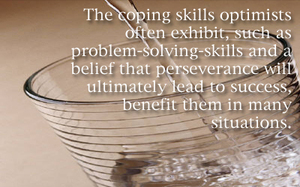The propensity to see the glass as half full can be an advantageous trait: optimism has been linked to benefits in both mental and physical health (e.g., Bromberger & Mathews, 1996; Scheier & Carver, 1985; Schultz et al., 1996). However, when positive expectancies are unwarranted, it might be better to adopt a more pessimistic view of the situation. In the case of gambling, statistics favor the house and over time it will almost always win. An optimistic gambler might remain at the table, convinced that the next hand will be a big winner; a gambler who sees the glass as half empty might be more inclined to walk away. Gibson and Sanbonmatsu (2004) probed the relationship between gambling and dispositional optimism in a series of studies, two of which are reviewed in this WAGER.
The researchers recruited students enrolled in an introductory psychology course. In the first study, 70 students completed the Revised Life Orientation Test (LOTR; Scheier, Carver, & Bridges, 1994)and a questionnaire containing 7-point Likert-type items assessing their gambling experience (e.g, “When I gamble, I expect to win”; “I sometimes gamble away more money than I originally intended to play”) and motivations for gambling (e.g., “I gamble because I like the rush”; “I gamble because my friends gamble and it allows me to spend time with them”). Fifteen students reported that they had never gambled in a casino and were excluded from analyses. In the second study, 118 students completed the LOT-R, a series of questionnaires, and participated in a mock casino blackjack game. Following a brief lesson in blackjack, the researcher then dealt and played 20 hands of blackjack with each student; no bets were placed. One week later, students were asked to recall how many of the 20 hands they had won, lost or pushed. The students were then given $10 and told they could bet 0-$10 on one last hand of blackjack. Students were told they could keep the amount in their pot after this hand was played. The amount they bet was recorded.
In the first study, optimists were more likely than pessimists to be motivated to gamble by a belief that they could win money in the long run (r (55) = .37, p<.01), but did not differ significantly on any of the other 6 motivations for gambling. Optimists also were more likely to expect to win then pessimists (r (55) = .32, p<.05). This belief was not altered for optimists who reported typically losing at a casino. However, pessimists who reported typically losing money in the past were more likely to reduce their expectations of winning money in the future (ß =.46, t (45) = 2.48, p<.02). In the second study, memory of past performance was significantly related to LOT-R score (r (117) = .19, p<.05): optimists overestimated the number of hands they had won the previous week whereas pessimists underestimated their performance. Further, the amount optimists bet on the final hand of blackjack was independent of their performance the week before. Pessimists were more sensitive to prior losses and bet significantly less after a poor performance (ß =.37, t (111) = 3.45, p<.001).
The above experiments were conducted in a laboratory setting; the gambling behavior observed might have been different if the participants were in a real world situation and had monetary incentives or disincentives to gamble. In addition, since the researchers did not employ a gambling problem screen, we do not know the extent of gambling disorders in the study population. Different factors might be important in determining the betting behaviors of social and problem gamblers. While there is no evidence that the subtle betting tendencies observed in this study will translate into increased risk of problem gambling for optimists, these findings suggest this would be an interesting question for future research to explore.
Every gift comes with a limit. The coping skills optimists often exhibit, such as problem-solving-skills and a belief that perseverance will ultimately lead to success, benefit them in many situations. However, Gibson and Sanbonmatsu have demonstrated that the same coping mechanisms might be detrimental in gambling situations. The relationship between dispositional optimism and gambling might provide useful insights into the cognitive process of gamblers and help clinicians better target the processes involved in their client’s gambling problems.
Comments on this article can be addressed to Rachel Kidman.
References
Bromberger, J. T., & Mathews, K. A. (1996). A longitudinal study of the effects of pessimism, train anxiety, and life stress on depressive symptoms in middle-aged women. Psychology and Aging, 11, 207-213.
Gibson, B., & Sanbonmatsu, D. (2004). Optimism, Pessimism, and Gambling: The Downside of Optimism. Personality and Social Psychology, 30(1), 149-160.
Scheier, M. F., & Carver, C. S. (1985). Optimisism, coping and health: assessment and implications of generalized outcome expectancies. Health Psychology, 4, 219-247.
Scheier, M. F., Carver, C. S., & Bridges, M. W. (1994). Distinguishing optimism from neuroticism (and trait anxiety, self-mastery, and self-esteem): A re-evaluation of of the life-orientation test. Journal of Personality and Social Psychology, 67, 1063-1078.
Schultz, R., Bookwala, J., Knapp, J., Scheier, M. F., & Williamson, G. M. (1996). Pessimism, age, and cancer mortaility. Psychology and Aging, 11, 304-309.





